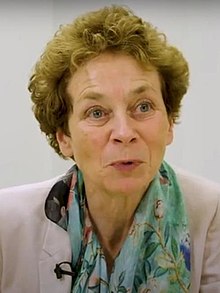Julia Crick
Julia Catherine Crick, FSA (born 1963) is a British historian, medievalist, and academic. She is Professor of Palaeography and Manuscript Studies at King's College London.[1]

Academic career
Crick began her career as a tutor and Fellow of Gonville and Caius College, Cambridge.[2] In 1992, she joined the University of Exeter as a lecturer in the Department of History and Archaeology. She was promoted to senior lecturer in 2001 and to associate professor in 2007. She has maintained her links with the university as an honorary university fellow.[3]
In September 2012, Cricke moved to King's College London where she had been appointed Professor of Palaeography and Manuscript Studies.[3] From 2013 to 2017, she was Director of the Centre for Late Antique and Medieval Studies.[2]
Crick specialises in medieval palaeography, medieval perceptions of the past, the history of medieval Britain to 1200 and land and power in Anglo-Saxon England. She sits on the editorial boards of Arthurian Literature and Anglo-Saxon, and was formerly on the board of Early Medieval Europe.[1]
On 21 March 2019, Crick was elected a Fellow of the Society of Antiquaries of London (FSA).[4]
Personal life
Crick is married and her husband is also a university professor. They have three children, including twins.
Selected publications
- Crick, Julia; van Houts, E. M. C. (2011). A Social History of England, 900-1200. Cambridge: Cambridge University Press. ISBN 978-1-13950-085-2.
- Crick, J. C. (2007). Charters of St. Albans (Vol. XIII). Oxford: Oxford University Press for the British Academy.
- Crick, J., & Walsham, A. M. (2004, paperback edn 2010). The Uses of Script and Print 1300-1700. Cambridge: Cambridge University Press.
- Crick, J. C. (1991). The Historia regum Britannie of Geoffrey of Monmouth, IV. Dissemination and reception in the later Middle Ages (Vol. IV). Cambridge: D. S. Brewer.
- Crick, J. C. (1989). The Historia regum Britannie of Geoffrey of Monmouth, III. A Summary Catalogue of the Manuscripts (Vol. III). Cambridge: D. S. Brewer.
References
- Professor Julia Crick. King's College London. Retrieved 17 May 2015.
- "Professor Julia Crick". King’s People. King’s College London. Retrieved 27 March 2019.
- "Professor Julia Crick". College of Humanities. University of Exeter. Retrieved 27 March 2019.
- "21 March Ballot Results". Society of Antiquaries of London. 21 March 2019. Retrieved 27 March 2019.